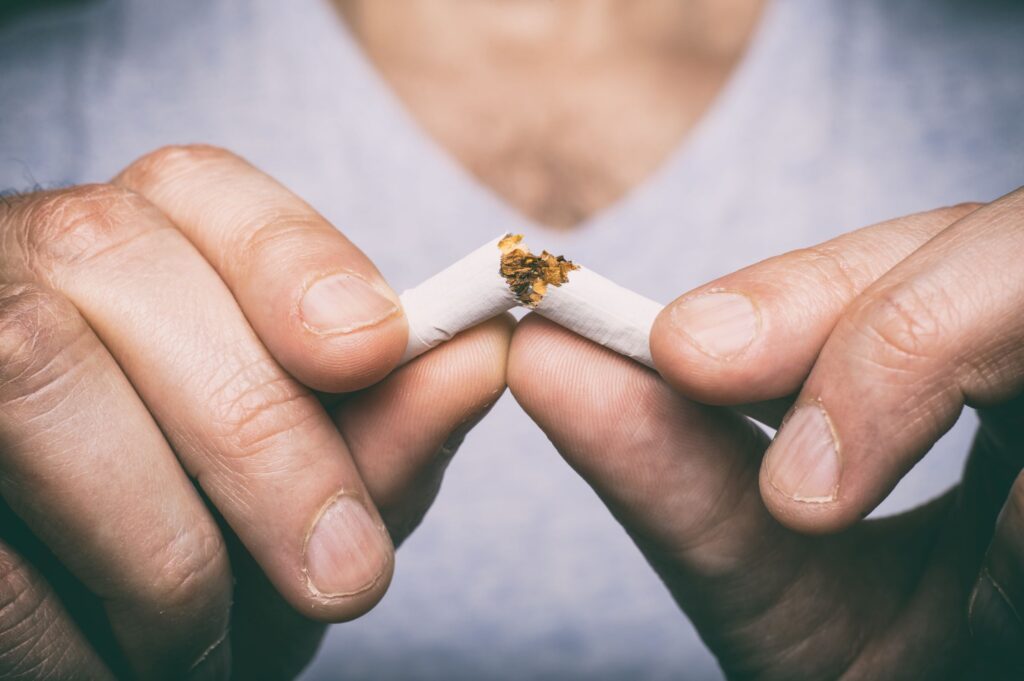There are many addictions out there, and each with their own labyrinth of symptoms and problems to navigate when it comes to tackling them. One of the many out there that affects almost 35 million Americans is smoking. This time on the Direct2Recovery blog, we wanted to talk about smoking, answer some common questions, and give common strategies to help anyone fighting the Good Fight.
What is Nicotine Withdrawal Like Exactly?
As with any other kind of withdrawal, it’s the physical, mental, and emotional effects of your body trying to adapt again. After sustained use and developing a dependency (addiction) on a substance your body has changed the way it operates, what it relies on, and expects. When you change that your body doesn’t appreciate it right away and needs time to work through it. Think of any time you’ve tried to cut something out of your diet as an example. It’s like that.
For not being considered a drug, nicotine is surprisingly powerful and the effects it has on your body take root after just a few weeks of smoking. The first several days to a week, are going to be the worst. That’s the time period when the nicotine is being cleared out of your system and your body will react with headaches, insomnia, and cravings.
If you are able to get over that immediate hurdle you’ll be able to get past the physical symptoms. The emotional and mental work will still be ahead of you but with time you can break through those symptoms as well.
What are the Physical Nicotine Withdrawal Symptoms
Withdrawal can be a range of different symptoms for many different people. Everyone is different and their health and history with smoking can mean the withdrawal develops in different capacities. Generally, someone quitting smoking can expect some variation of these symptoms:
Appetite
An increased appetite is totally normal while going through withdrawal. Smoking triggers several chemical reactions in the body that typically reduce hunger. Without nicotine to subdue your hunger it will naturally increase. For some people, this looks like craving carbs and sugar (putting on a couple of pounds while quitting). Others will eat more simply to try and pass the time they used to spend smoking. Regardless, the hunger will settle into a more natural state given time.
Cravings
Of course, the craving for nicotine again will be the biggest symptom you will have to deal with the longest. A craving is an overwhelming emotional experience that tries to take control and seek out a result or engage in certain behavior. But cravings pass! Nicotine cravings will come and go, typically lasting only 15 to 20 minutes.
Note: Fighting cravings will likely be the hardest part of going through withdrawal. You’ll need to discover what triggers your cravings and how best to avoid them or get through them without smoking. Some people find it hardest to fight cravings when they are drinking alcohol or around others that are smoking.Understand that these cravings are just a part of quitting smoking, be mindful of what triggers them.
Fatigue, Restlessness, and Insomnia
One of the key features of nicotine is how it works as a stimulant. That means it perks you up, with every cigarette being another dose of that same stimulant it keeps you running high. When you kick smoking, the lack of nicotine in your body will likely cause you to feel tired.
Unfortunately, withdrawal also occasionally takes the form of restlessness or insomnia. These three symptoms combined are tough, but this too will pass.
Cough
The body is a natural cleaning and maintaining system, however when it is constantly being subjected to outside chemicals such as nicotine, it has a hard time performing those necessary duties. When you’ve stopped smoking, your respiratory system specifically can start trying to clear itself out from the built-up crud and damage. A cough is likely and may last weeks as your body does it’s best to repair.
Headaches and Dizziness
Typically mild, headaches and dizzy bouts are usually the first symptoms to show and the first to taper off.
Constipation
Tobacco and nicotine specifically have an effect on the digestive tract and when that chemical changes the behavior or of your digestive tract can change with it. Constipation is a common and unpleasant side effect for the first month or so.
This topic is quickly growing longer than we expected it to so we’ll continue the discussion of nicotine withdrawal and quitting smoking more next time on the blog. Until then remember that these symptoms are temporary and so long as you stay committed to your course you will after some weeks come out the other end healthier and happier.





